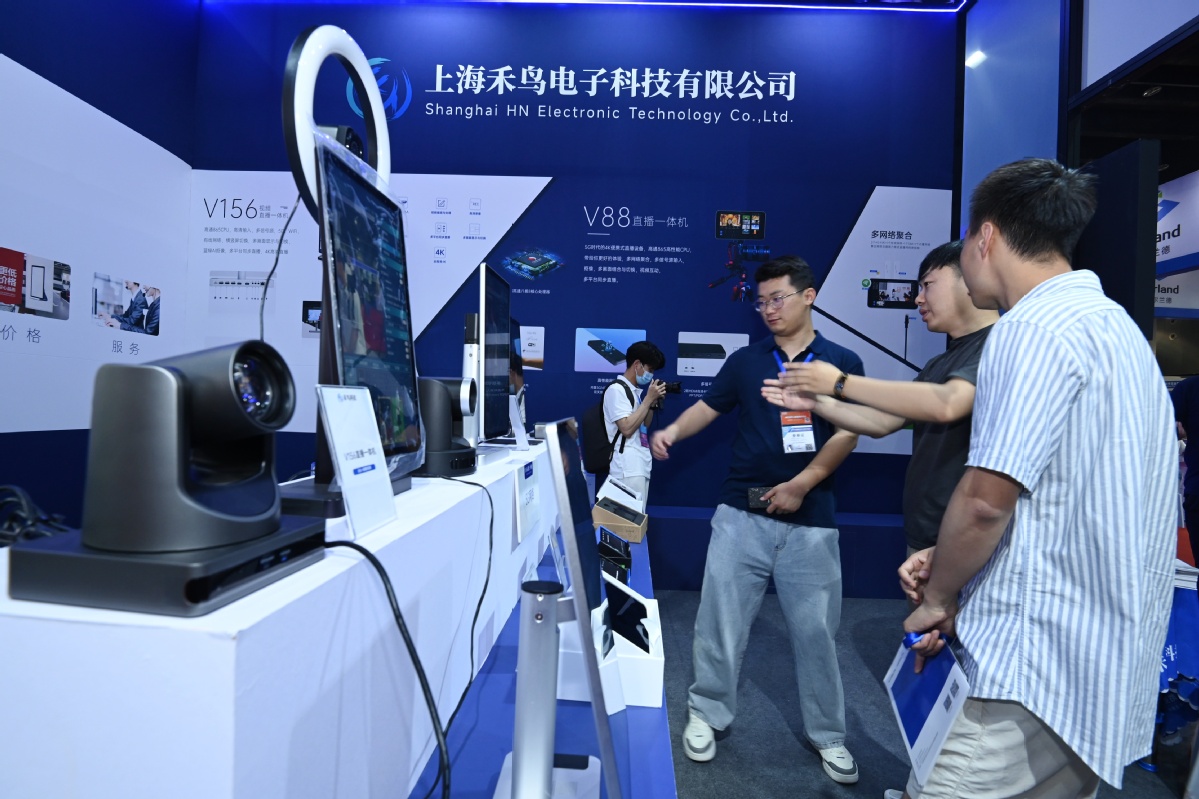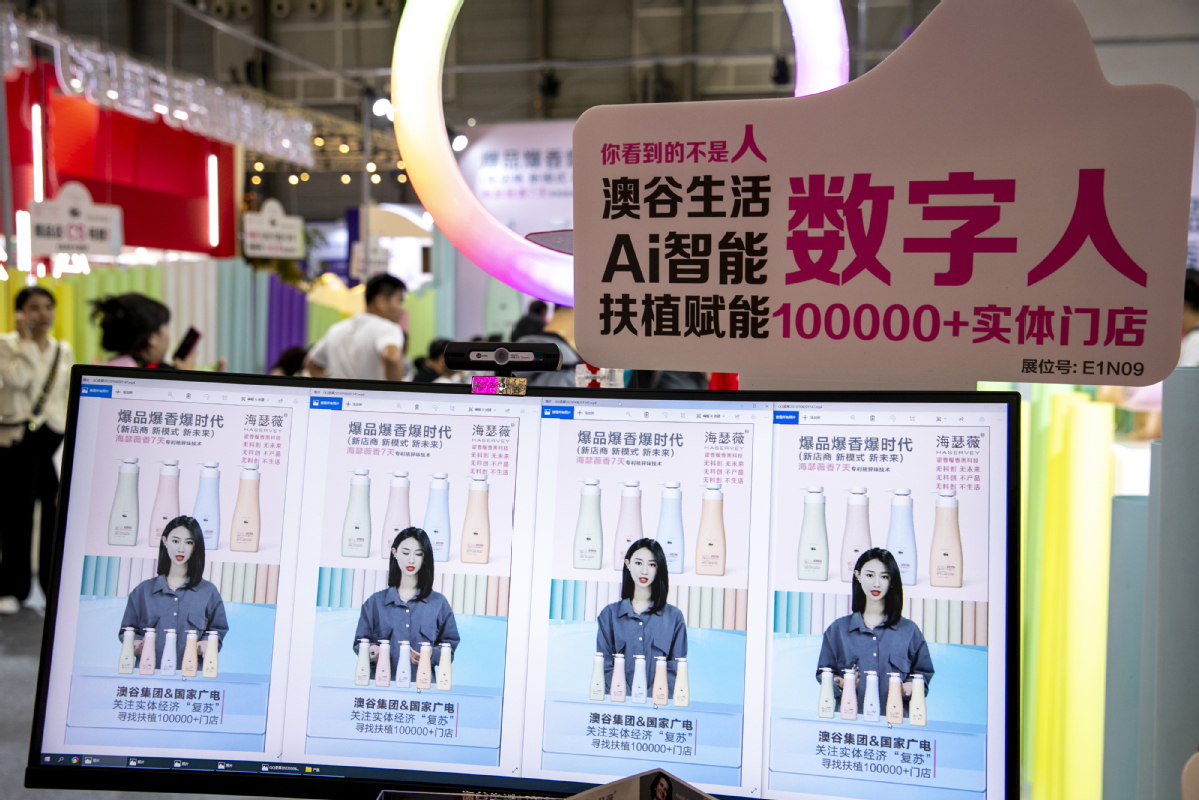AI virtual hosts change game for livestreaming


Digital anchors favored for tireless, scandal-free work; humans still retain edge
In a livestreaming base in the Binjiang district of Hangzhou, capital of Zhejiang province, a batch of digital anchors is tirelessly introducing various types of products 24 hours a day.
These virtual hosts can mimic human facial expressions and movements and are almost indistinguishable from real humans. They can interact naturally with consumers and answer their queries promptly.
Hangzhou is China's e-commerce livestreaming hub where sales personnel promote products in real-time broadcasted sessions, with more than 50,000 human anchors and a large number of virtual hosts flocking into livestreaming rooms.
Lier Baby, a top-notch livestreamer of Taobao Live, Alibaba Group's livestreaming platform, enabled her six different virtual replicas to be on the same stage in a live broadcast at the end of July.
These virtual anchors offer a glimpse into China's burgeoning e-commerce sector, which is embracing artificial intelligence-powered virtual humans. A string of Chinese tech companies has ratcheted up efforts to promote the use of virtual hosts for livestreaming.
Qianxun Holdings, one of China's top livestreaming companies, recently rolled out an AI hosting service and a one-stop comprehensive AI livestreaming service platform.
Tao Yadong, a partner of Qianxun Holdings and CEO of Qianyu Intelligence, said: "It costs about 150,000 yuan ($20,730) to 250,000 yuan per month to run a traditional livestreaming room with a dozen workers and equipment. In comparison, brand owners just need to spend several thousand yuan to operate a virtual livestreaming room helmed by a virtual host."
Tao said AI-powered hosts are professional, have stable demeanors and can work 24 hours a day. He noted the tests conducted by Qianxun showed that the performance of virtual hosts in terms of gross merchandise volume, average view duration, number of viewers and transaction rates is better than that of human hosts.
Qianxun Holdings has also inked cooperation agreements with eight companies, such as online retailer Suning and sportswear brand Xtep, to promote their products through leveraging virtual hosts in livestreaming sessions.
Tao said virtual hosts are digital clones of real humans and their production should be authorized by real people. At present, the company owns nearly 100 virtual humans, he added. The advances in AI technology have improved AI hosts' interactive capabilities.
In addition, virtual hosts with different prices boast diverse interaction functions." However, under current technical conditions, the digital anchors can't totally replace real humans as it is difficult for them to establish trust with fans," Tao added.

Data from market consultancy iiMedia Research showed that 948 newly registered companies offered virtual host livestreaming services in 2022.
Some 47.5 percent of the interviewed users said that human livestreamers and virtual ones will coexist in the future. Moreover, the demand for livestreaming hosts is expected to reach 9 million in 2025, according to iiMedia Research.
Baidu Inc has released its digital avatar platform Xiling, which provides a complete set of services for the creation and operation of virtual hosts, virtual celebrities and virtual brand spokespeople for clients in fields like broadcasting, television, internet, finance and retail.
In a test, a virtual livestreamer created by Xiling sold smart watches for 33 hours, generating 13,000 yuan in sales. Virtual hosts can change makeup and clothing at the user's request to improve the shopping experience of the latter.
Li Shiyan, head of Baidu's digital human and robotics section, said an increasing number of brands are looking to use virtual hosts in livestreaming and other marketing campaigns, which is expected to help enterprises reduce at least 50 percent of operational costs by cutting spending on brick-and-mortar livestreaming locations, hardware and hiring human anchors.
"The virtual human industry is still in an early stage and there are some challenges, such as how to produce low-cost digital assets and digital content, and how to make digital humans interact with real people more naturally," Li said.
Resolving these issues relies on the iteration of technologies such as natural language processing and computer vision, Li said, adding that Baidu will continue to pour capital and manpower into the digital human industry.
According to iiMedia Research, the revenue of China's e-commerce livestreaming sector reached 1.4 trillion yuan last year, up 19.5 percent year-on-year. This is projected to reach 2.1 trillion yuan in 2025.
Global consultancy Forrester said more business-to-consumer, or B2C, brands are using virtual hosts to attract digital-savvy and novelty-seeking young consumers, as they cost less than human talent and reduce risks such as scandals.
"The use of virtual hosts in livestreaming sessions can bring a feeling of freshness to users and brand owners can attract new consumers via this innovative method," said Mo Daiqing, a senior analyst at the Internet Economy Institute, a domestic consultancy.
Mo said AI-powered digital humans in livestreaming can help improve operating efficiency, enhance the shopping experience, boost sales of products and promote the development of e-commerce livestreaming.
Virtual livestreamers can play an important role in finishing tedious and repetitive tasks, thus allowing human hosts to devote more time to creative work. However, they will not replace human hosts, Mo added.
In August, Chinese authorities issued a 24-point guideline for managing generative AI services. The country encourages the innovative development of generative AI and supervises the technology using methods compatible with innovation and development.
Pan Helin, co-director of the Digital Economy and Financial Innovation Research Center at Zhejiang University's International Business School, said he is optimistic about the business prospects of virtual humans in the e-commerce livestreaming segment.
More efforts are needed to improve 3D modeling, rendering and motion capture technologies to bolster the development of the country's virtual human sector, Pan said.
Thanks to technological advancement in AI, digital avatars bearing a close resemblance to real humans in appearance and behavior have been put into service — not only in livestreaming, but also in a wide range of other segments, industry experts said.
For instance, Baidu has worked with Shanghai Pudong Development Bank, China Everbright Bank and China Unicom to launch service-oriented virtual humans.
Chinese AI pioneer SenseTime's virtual human acted as a shopping guide at Aeon Mall in Guangzhou, Guangdong province, as well as a customer service representative at Bank of Ningbo's Shanghai branch, providing inquiry services for customers.
The size of China's virtual human market is forecast to reach 270 billion yuan by 2030, according to an industry report released by QbitAI, an industry services platform focusing on AI and cutting-edge technology.
Officials have high hopes for the market as Beijing released an action plan last year that bolsters the innovative development of the virtual human sector. The scale of the virtual human industry in Beijing is expected to exceed 50 billion yuan by 2025.
The capital city aims to develop one or two leading virtual human companies by 2025 with revenue surpassing more than 5 billion yuan each, and 10 companies that would generate annual revenue of 1 billion yuan each, according to the plan.
The plan also calls for efforts to develop virtual reality, augmented reality and mixed reality terminal equipment, and apply speech recognition, natural language understanding and other artificial intelligence technologies to improve the interactive qualities of virtual humans.
"Although the digital avatar sector is still nascent, the appearance, gestures and actions of virtual humans will become more and more refined and closer to that of real humans," said Yu Jianing, executive director of the metaverse industry committee at the China Mobile Communications Association, a Beijing-based industry association.
The accelerated application of 5G and research and development of next-generation wireless technology 6G will fuel the virtual human industry, Yu said, adding that they will become more intelligent and be able to give personalized feedback based on real-time information as a result of advances in AI.
Chen Duan, director of the Digital Economy Integration Innovation Development Center at the Central University of Finance and Economics, said virtual humans are increasingly being used in livestreaming, brand promotion, advertising, gaming and entertainment.
However, new problems for the industry have also emerged, such as ethics, data security and personal privacy protection. Chen called for efforts to formulate relevant laws and regulations on the ownership of digital characters and the standardization of their behavior.




































